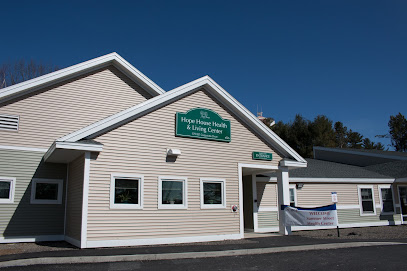
The state of Maine is considering LD 2138, a bill that would increase the overnight bed rate low-barrier homeless shelters receive to $90 per bed, per night. The funding couldn’t come at a better time, as it is reported that the state’s low-barrier homeless shelters are collectively $4.1 million in the red, annually. The bill is before the Housing committee at the Maine State House today, and I wrote testimony in support of it. First, let’s talk about how this issue is affecting us here in Bangor.
Hope House needs more hope. Funding, actually.
If you’re a Bangor resident, you’ve already heard the news about the Hope House’s financial situation. Penobscot Community Health Center, which operates the Hope House, is running the facility at a loss. $600,000 last year, and a projected $800,000 loss coming this year.
That ongoing loss is not something PCHC wants to continue to eat, so they’re looking for new ownership.
But what about those ARPA funds?
Last year PCHC applied for and was approved to receive $2,484,880 from the city of Bangor’s $20.48 million in ARPA funds for renovation and expansion of the Hope House. At that time there was no public mention of the Hope House’s financial woes. PCHC had to have known at that time they were upside down on the Hope House. Why would PCHC apply for funding to renovate and expand when the ability to continue operating was in question?
There’s no doubt the facility needed to expand. The need for low-barrier shelter is at an all-time high. But if the entire facility was in jeopardy because of poor funding, shouldn’t that have been the angle to address first?
Was PCHC looking for a carrot to court new owners with?
So why wouldn’t PCHC make that the first thing they divulged when they applied for ARPA funds? Why not apply for funding needed to keep the doors opened for the next 2 years? They likely would have gotten the money. The Hope House, like the banks during the last financial crisis, is “too big to fail.” Letting the Hope House close is not an option. Which is likely why no scrutiny was given by Bangor City Council to the financial status of PCHC with the Hope House. The same scrutiny that other organizations were given.
The timing of making the announcement that they’re looking for new owners and how much money they’re losing after they received approval of the ARPA funds doesn’t look very good.
Shopping around for someone to take over the Hope House prior to the ARPA award is a difficult task. I’m not aware of any non-profits who are sitting on piles of money specifically for taking over financially troubled shelters. If all you have to offer is a building and a book full of red ink, it’s going to be a tough sell. But if you add in a $2.4+ million-dollar bone with the deal, suddenly your pool of takers expands. Was this the motivation? Again, the timing of that news being released after the ARPA funds were allocated to PCHC is a bad, bad look.
This bill is about more than just the Hope House
Lawmakers in Augusta are asking questions. “What is Bangor doing with their $20.48 million they got from ARPA?” “What about the money PCHC got from ARPA?” Those questions are distracting from the fact that this is actually a statewide problem.
As I mentioned in the introduction, shelters statewide are collectively in the hole for over $4 million a year. The Hope House is only 20% of that debt. That leaves a $3.3 million shortfall annually for shelters across Maine, and that requires attention and action by the State Legislature. Legislators across the state need to look past the Hope House and see this issue for what it is: a problem for the entire state.
Will this keep the Hope House open? What’s Plan B?
Based on quotes in the paper, the funding will certainly help stave off a closure. But there’s been no guarantee given that PCHC will keep the doors open to the Hope House if they can’t find a buyer, even if funding increases.
If the bill doesn’t pass, or if it doesn’t provide enough money to prevent the closure, City Council is going to have to change the purpose of that ARPA award. As of the end of October 2023 the money is still sitting in the city of Bangor’s ARPA bank account. They’ll need to reapprove it for operational costs, and based on PCHC’s projections, that should keep the Hope House solvent for at least 2 years. Enough to buy some planning time. Then it needs to be all hands on deck to address the long-term viability of the Hope House. It remains to be seen if the City Council has the will to take that kind of action.
For our statewide needs, Maine should be keeping an eye on what New York City started last year. They created a $15 million revolving fund for nonprofits to build, own, and operate shelters. The fact that there is both public and private money involved is certainly noteworthy.
Adding my voice of support for LD 2138
As a resident of Bangor, I certainly don’t want to see the Hope House close. This is bigger than the Hope House, and bigger than Bangor. This affects low-barrier shelters statewide. I submitted the following testimony to the Housing Committee in support of LD 2138:
Honorable Members of the Joint Select Committee on Housing,
My name is Michael Beck and I am a resident of Bangor. I urge you to support LD 2138 and ask for your committee to recommend to the Maine Legislature that the bill ought to pass. We must increase the overnight bed rate of reimbursement for low-barrier shelters to $90 per night, as the bill prescribes.
Low-barrier shelters offer more than just a roof over someone’s head. They provide access to critical services, build strong community connections, and empower individuals to rebuild their lives. Investing in these shelters is not merely a budgetary allocation; it is an investment in the dignity, health, and well-being of our fellow Mainers. Today, that investment is woefully short of what is required.
The Hope House, our low-barrier shelter in Bangor, Maine, is under threat of closure due to a lack of funding. Last year, the Hope House ran a deficit of more than $600,000. This year the Hope House is projected to lose more than $800,000. Because of this, PCHC has been looking for new ownership to take over the facility. If they are unable to find another organization to take it on, PCHC has signaled that they will close the shelter. This would be catastrophic. Not only for Bangor, but for the communities across Maine that have made Bangor their de facto homelessness response system by regularly sending their unsheltered residents to the Hope House.
This is more than a Hope House issue. Low-barrier shelters across Maine are collectively in the red to the tune of over $4 million dollars annually now. The Hope House is simply the canary in the coal mine. The first domino to fall. If the Hope House and other low-barrier shelters in Maine close, there will be a ripple effect of negative consequences.
The immediate consequence of not passing LD 2138 would be a catastrophic shortage of beds for Maine’s most vulnerable citizens. Without Hope House and other low-barrier shelters, more individuals experiencing homelessness would be forced to sleep on the streets, in parks, or cars, exposing them to harsh weather, increased health risks, and potential violence.
Overburdened existing shelters would face a surge in demand, leading to overcrowding, longer wait times, and compromised sanitation. This would put additional pressure on already stretched-thin emergency services, social workers, and healthcare providers. Increased hospitalizations and mental health crises would likely follow, leading to higher costs for everyone. Not passing this bill will cost the state and its communities more than the cost of increasing the funding.
Visible homelessness can negatively impact the social fabric of our communities. Deterred tourism, decreased property values, and a general sense of unease are all potential consequences. We must remember that homelessness is not simply a housing issue; it’s a symptom of deeper societal problems that we can’t afford to ignore.
LD 2138 is not just about numbers on a spreadsheet; it’s about investing in the lives of our fellow Mainers. It’s about providing a safe space, a warm meal, and offering the first steps for people to rebuild their lives. Passing this bill is not just the right thing to do; it’s also the fiscally responsible choice in the long run by preventing the downstream costs of unsheltered homelessness. Not passing this bill will cost the state and its communities far more tomorrow than the cost of increasing the funding today.
I urge you to recommend LD 2138 Ought to Pass. Let’s continue to build a Maine where everyone, regardless of circumstance, has access to the basic necessities of life and the opportunity for a brighter future.
Respectfully,
Michael Beck of Bangor







